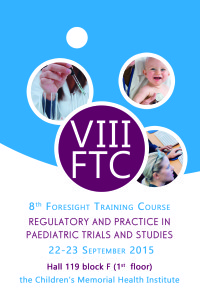 On September 22nd-23rd, 2015, the DEEP project as a best practice for the trial management in EU/non-EU paediatric trials was presented at the VIII edition of the Foresight Training Course (FTC), hosted by the Children’s Memorial Health Institute in Warsaw (Poland) and promoted by the Gianni Benzi Pharmacological Research Foundation (FGB, Italy) in collaboration with the EU-funded project GRiP (Global Research in Paediatrics). The Foresight Training Courses are short courses for experts in the field of Regulatory Sciences organised by the Gianni Benzi Foundation with the aim to contribute to high level training in order to satisfy the needs and requirements of the sector. The meeting entitled “Regulatory And Practice In Paediatric Trials And Studies” was particularly focused on several issues impacting on paediatric clinical research, and in particular on the forthcoming novelties in the field: the entry into force in Europe of new rules regulating clinical research and the ongoing debate on the impact of the Paediatric Regulation after 10 years.
On September 22nd-23rd, 2015, the DEEP project as a best practice for the trial management in EU/non-EU paediatric trials was presented at the VIII edition of the Foresight Training Course (FTC), hosted by the Children’s Memorial Health Institute in Warsaw (Poland) and promoted by the Gianni Benzi Pharmacological Research Foundation (FGB, Italy) in collaboration with the EU-funded project GRiP (Global Research in Paediatrics). The Foresight Training Courses are short courses for experts in the field of Regulatory Sciences organised by the Gianni Benzi Foundation with the aim to contribute to high level training in order to satisfy the needs and requirements of the sector. The meeting entitled “Regulatory And Practice In Paediatric Trials And Studies” was particularly focused on several issues impacting on paediatric clinical research, and in particular on the forthcoming novelties in the field: the entry into force in Europe of new rules regulating clinical research and the ongoing debate on the impact of the Paediatric Regulation after 10 years.
Donato Bonifazi, DEEP Project Manager presented the project in the context of the international paediatric trials that have to face a default level of complexity, due to regulatory, methodological, ethical and administrative issues, especially when they are registrative and international as DEEP is.
In particular, the specific challenges that DEEP has addressed and is still facing with reference to the recruitment and patient’s retention have been described, since DEEP is a ‘Registrative’ CTs with economic burden, ethical stringent provisions and GCP-ICHE11 obligations that involves not only a paediatric multi-ethnic population with different cultures, laws and children of different ages but also a rare and disperse population involving different Rare Congenital Anaemia.
Moreover, the DEEP multisteps strategy to address these issues has been presented, resulting from the following key aspects:
• the organisation of a ‘trials management plan and infrastructure’ including SOPs preparation, data management, drug management, pharmacovigilance, monitoring, etc;
• the implementation of a unique procedure and a unique CTA ‘package of documents’;
• the developments of a ‘patients tailored approach’ including children, families and association.
To conclude Donato Bonifazi updated on the patients’ recruitment that is currently proceeding successfully thanks to a continuous and coordinated activity of the TMT and the PIs and the continuous discussion of the Protocol-related issues among Principal Investigators, Trial Management Team and all the study key contacts that has led the inclusion of many new centres.
The event was also the occasion to discuss, in the framework of an international multi-stakeholders debate, the present and the future of the paediatric research including the efforts made by the scientific community and the ongoing projects such as the proposed Paediatric Research Infrastructures (EPCTRI) and the global networks.

